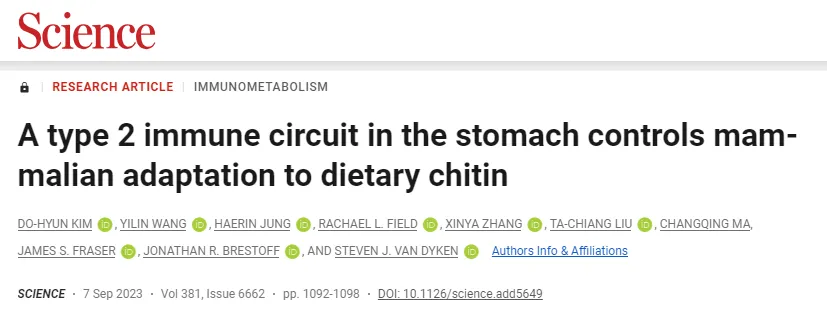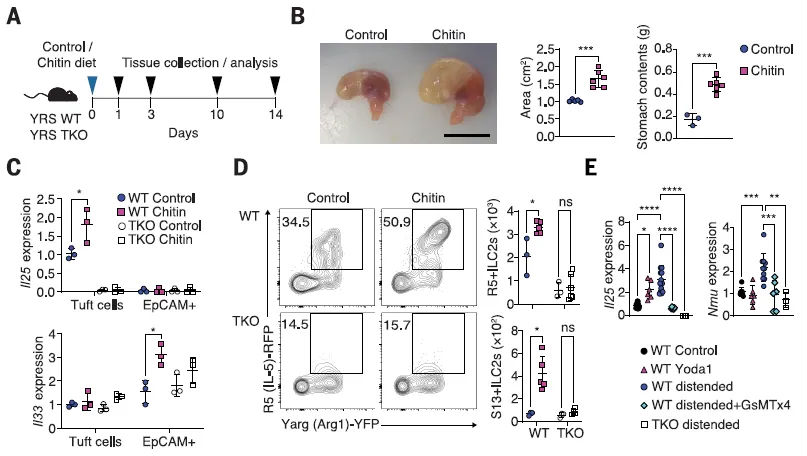Food is of paramount importance to the people, and it directly affects human health. The food we consume has a significant impact on our physiological functions and metabolic processes. Good and reasonable healthy eating habits are an important aspect of health care, which can promote healthy growth and development of the body. Chitin, also known as chitin, is a natural polysaccharide that is abundant in arthropods and fungi. It can initiate type 2 immune responses and is widely present in marine exoskeletons, mushrooms, and crustacean shells. Previously, the mechanism of action of dietary chitin in mammals was not clear.

Recently, researchers from the University of Washington School of Medicine published a research paper titled "A type 2 immune circuit in the stool controls mammalian adaptation to dietary chitin" in the journal Science. This study shows that consuming chitin can activate the innate immune response in the stomach, promote the production of more chitinase by cells, and improve the metabolic health of high-fat obese mice, including weight gain reduction, body fat reduction, and resistance to obesity.

The immune system is a defense system in our body that helps us resist various threats, including bacteria, viruses, allergens, and cancer. In this study, researchers analyzed the gastrointestinal response of mice to dietary chitin, feeding different mice with 5-20% chitin feed or a control feed containing fiber, with the same food intake. Researchers found that compared to the control feed group, mice in the chitin group showed significant gastric dilation and more gastric contents. Gastric epithelial cells quickly responded to chitin, activating the innate immune response in the stomach and promoting the production of more chitinase to break down chitin. In addition, the chitin group mice also increased the levels of gastrin and glucagon like peptide-1.

Chitin induces innate type 2 immune response. As the gut microbiota is the main source of chitinase, researchers also conducted experiments using sterile mice lacking gut bacteria. Research has found that ingestion of chitin induces gastric dilation, eosinophilia, ILC2 expansion, and cluster cell proliferation in germ free mice. This indicates that chitin in the diet can activate immune responses even in the absence of microbial communities. Finally, as obesity is influenced by neuronal ILC2 interactions and type 2 immune responses, researchers also tested the effect of dietary chitin on obesity. Researchers have found that dietary chitin has the greatest impact on obesity in mice when it activates the immune system but is not digested. In obese mice fed a high-fat diet, mice lacking chitinase consumed dietary chitin, resulting in a significant decrease in body weight and fat mass. Additionally, their resistance to obesity increased, and mice showed significantly improved insulin sensitivity, indicating that dietary chitin can regulate metabolism and contribute to metabolic homeostasis.

Chitin improves metabolic health in high-fat obese mice. In summary, the results showed that dietary chitin activates innate immune responses and also improves metabolic health in high-fat obese mice. Mice showed a significant reduction in body weight and fat mass, as well as increased resistance to obesity. This provides a new approach for treating metabolic diseases such as obesity. Next, researchers will test whether chitin can control obesity in humans and combine it with methods that inhibit gastric chitinase. Paper link: DOI: 10.1126/science. add5649
Source | Medical Novi
Writing | Song Dynasty Grammar
Edit | Swagpp